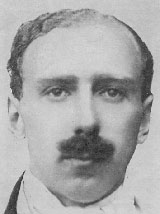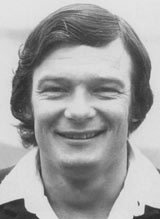Surrey cult heroes
Nick Mason on the cult heroes produced by Surrey
Nick Mason
19-Dec-2005
Percy Fender
(Surrey career 1914-1935)
|
|

|
Alf Gover
(1928-1947)
(1928-1947)
Between 1928 and 1947 Surrey came nowhere near the Championship, rarely being able to coax winning performances from their attack on an Oval square which remained a batsman's paradise until its prison-camp days in the Second World War. Not an atom of blame for this should be laid at Gover's door. He bowled over after over (more than 10,000 of them for Surrey alone) at high pace off a long, ungainly run. He was far too quick for many a county opener; unfortunately the resulting edges were also too quick for his fallible slip cordon. The Oval crowd loved him for his heart; for taking 200 first-class wickets in 1936 and 201 the next year; for the lasting enthusiasm that saw him, ramrod-straight in his faded England sweater (four Tests, not much to show for them), teaching generation upon generation at his celebrated Wandsworth cricket school; and for his having been born on February 29, which allowed him to celebrate his 21st in 1992.
Geoff Whittaker
(1937-1953)
(1937-1953)
Surrey's relentless progress from '40s drought to '50s domination was often dour, with a covey of batsmen best described as `stalwart' trying to consolidate the work of the increasingly effective young bowlers. But for excitable boys on those uncomfortable benches at square-leg in front of Archbishop Tenison's School, the arrival of Geoff Whittaker well down the order always evoked a frisson. He was unceremonious and unafraid. He hit the ball uncommonly hard (he once managed nine sixes in an innings at Northampton) and had perfected a murderous flat-batted pull that bounced once, if at all, before whacking into the waist-high concrete wall in front of us. We would leap to our feet and shout for more, and he, we kidded ourselves, would do his best to oblige. By the time Surrey's glory days arrived he was no longer sure of his place, and left to coach in Jersey. But the schoolboys of the lean years never forgot him.
|
|

|
Robin Jackman
(1966-1982)
(1966-1982)
The appeal was loud and unrestrained, and echoed off the gasholders with such frequency that it became almost counter-productive. From the mid-1960s to 1982 it was the signature of Robin Jackman, an unstinting fast-medium seamer who flogged every hint of life from the Oval pitch. It took Jackman several seasons to establish himself in a side over-endowed with opening bowlers and, though he was regularly tormenting top-class batsmen, it took a decade of hints, pleas and downright demands before England's Test selectors agreed, far too late, to cap him at the age of 35. By then he had taken five wickets in an innings against every other county, taken 121 cheap wickets in 1980 and been named Cricketer of the Year by his fellow professionals. Born in India under the Raj, he spent most of his winters coaching and playing in South Africa but it was Surrey who season after season reaped the reward for his dedication, experience and fierce loyalty.
David Ward
(1985-1996)
(1985-1996)
David Ward was a carpenter from Croydon and didn't play his first match for Surrey until he was 24. But for a dozen or so years he was the relaxed, grinning face of a desperately underachieving county, a side studded with stars and fatally short on consistency. On poor days he looked a heavy-footed plodder; on good ones, with his heavy-duty bat offering no mercy, he was well-nigh unstoppable. He scored a remarkable 2,072 first-class runs in 1990, including seven hundreds; he kept wicket with ebullience whenever he was needed, and patrolled the boundary, chatting happily to the spectators, when he wasn't. One May morning in 1994 Alec Stewart declared with Wardy 294 not out; the crowd was livid, the genial pro grinned his unmistakable horsey grin and got on with the job. No one could have guessed it at the time, but he would never score another first-class century.